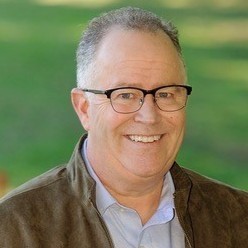The Emperor’s New Thought Leadership Platform
February 15, 2024
Top execs at Palantir take 2,488 very fancy words to argue that it would be good if their fellow Silicon Valley executives had more thoughts on social matters.
Hey, I run the Executive Communication Council. It’s part of our charter, “To showcase to the business community and to society at large, what great leadership communication is, and the profound impact it can make.”
So when a corporate executive comes out with any piece of communication that sounds like serious thinking, I leap to my feet like a baseball fan does upon hearing a loud crack of the bat.
“Silicon Valley Has a Harvard Problem,” banged the headline over a Time piece this week by Alexander C. Karp, CEO of the software-marker Palantir, and his public affairs chief and legal counsel Nicholas W. Zamiska.
It might be! It could be! It isn’t.
This 2,488-word essay begins with an anecdote about the Nazi march in Skokie, Illinois in the late 1970s that’s about as relevant to corporate leadership as it sounds. It goes on to incoherently compare the recent university presidents’ testimony before Congress to Silicon Valley execs’ reluctance to express their own ideas—or, even to have them. The authors lament:
A broad swath of leaders in the U.S., from academic administrators and politicians to executives in Silicon Valley, have for years often been punished mercilessly for publicly mustering anything approaching an authentic belief. The public arena—and the shallow and petty assaults against those who dare to do something other than enrich themselves—has become so unforgiving that the republic is left with a significant roster of ineffectual and often hollow vessels whose ambition one would forgive if there were any genuine belief structure lurking within. The current system in Silicon Valley leaves little room for capable and original thinkers whose principal motivation is something other than self-promotion, and who often lack a willingness to subject themselves to the theater and vicissitudes of the modern public sphere.
That sounds terrible!
Except it’s been true of corporate leaders since the outset of corporate leaders. Just sure as Friedrich Neitzsche, Jean Paul Sartre and Milton Friedman weren’t known for running companies, corporate CEOs haven’t been known for having original social theories—or even economic ones. About thirty years ago, a veteran CEO speechwriter described the job to me: “It’s ‘Write down my ideas as if I had them.’”
Most prominent among the rule-proving exceptional CEOs who have held and defended stimulating political convictions over the years is Henry Ford, who tended to attribute “all evil to Jews or to the Jewish capitalists.” Otherwise, most CEOs over the last hundred years have spent most of their time artfully speaking out against government regulation, and promoting other business interests. They are businesspeople, after all.
What “authentic beliefs” and “genuine belief structure” do these Palantir execs courageously express in this big think piece?
At Palantir, we build software and artificial intelligence capabilities for defense and intelligence agencies in the U.S. and its allies across Europe and around the world. Our work has been controversial, and not everyone will agree with our decision to build products, including software that enables offensive weapons systems, for the U.S. military. But we have made a choice, notwithstanding its costs and complications. And many overlook the benefits.
Then it’s back on the straw-man attack, against the beleaguered university presidents and the gutless Silicon Valley execs:
The congressional testimony by the university presidents exposed the bargain that contemporary elite culture has made to retain power—that belief itself, in anything other than oneself perhaps, is dangerous and to be avoided. The Silicon Valley establishment has grown so suspicious and fearful of an entire category of thought, including contemplations on culture or national identity, that anything approaching a worldview is seen as a liability.
Goethe is quoted. Then “Erving Goffman, a Canadian-born sociologist.” And Allan Bloom and Henry Kissinger and somebody named Geoffrey Kabaservice and, inevitably, poor George Orwell. The piece gasses pompously on, reminding one of Dylan Thomas, in his cups one night at the White Horse Tavern, interrupting himself to complain, “Someone is boring me. I think it’s me.”
A college English professor of mine once said that Henry James, in his novels, “Chews more than he bites off,” and I’ve never read anything that’s more true about than this essay. I keep scouring this vast wordscape for a single paragraph that expresses essence of these authors’ idea clearly. Alas, I can only find twenty, that express it terribly!
And so I paraphrase: The idea is that corporate leaders, especially in Silicon Valley, should have more ideas than they do, about social things. What kinds of ideas? The authors don’t say.
Couldn’t you just thank God for thought leadership like that?
A long walk, as we say in Chicago, for a short beer.
Or, to get back to our baseball parlance—pitchers and catchers reported to spring training this week—a high fly ball up the elevator shaft, fielded by the shortstop to retire the side.





As you know, there’s no shortage of pomposity, entitlement and arrogance out here in “the Valley” (capital V!).
My translation, based on your fine summary: “We make a shitload of money selling software to the military-industrial complex and we’re fine with that, naysayers, because we’re “original thinkers” with a “belief structure” and we should be praised for making a choice, notwithstanding the costs to our impressively large yet sensitive egos!
“A long walk for a short beer,” indeed. Love your Chicagoisms … got to remember that one. 🙂
I think you’ve got it down, Brian. Making this piece a long walk for no beer whatsoever. (Seriously: This phrase is so ingrained in Chicago that my daughter once ran the length of a soccer field to get a ball that someone else wound up kicking, and muttered to herself, “Well that was a long walk for a short beer.” She was nine.)